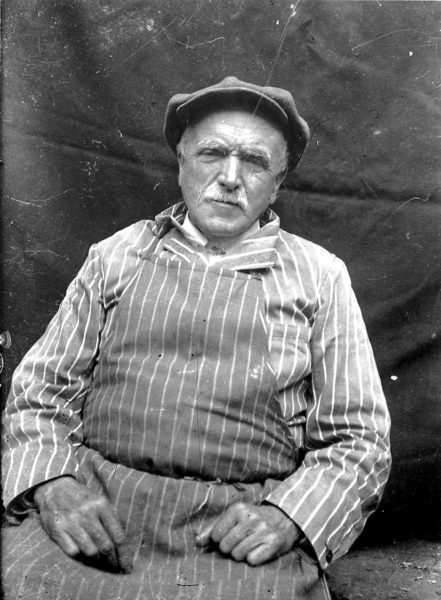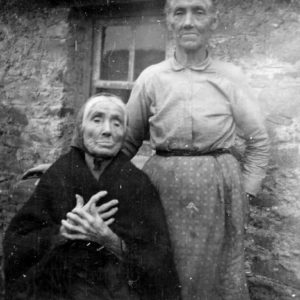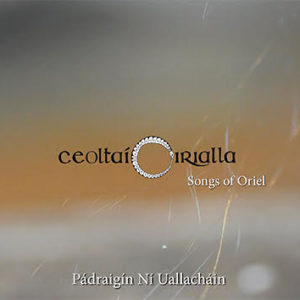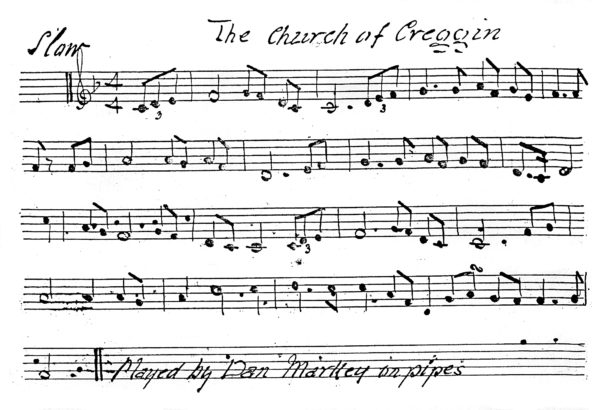Úirchill a’ Chreagáin
Background
Video above is a clip from BBC ‘Amhráin Aduaidh’ Directed by Bríd Maloney. With kind permission of Michael Quinn and Clean Slate TV (c) 2012
(see A Hidden Ulster pp. 250-58 for detailed references and information)

Creggan Graveyard near Crossmaglen County Armagh
This is the most celebrated song in the Oriel tradition. An aisling or vision poem, it was once described as ‘a monument more enduring than bronze’. It is one of two or three songs of which a popular version survived in the unbroken oral tradition in Oriel after the loss of the Irish language as the vernacular of the locality.
It was written by Art Mac Cumhaigh from Creggan (1738-73), whose song-poems were very popular in the songs of the people. Many of them lament the downfall of the O’Neill chieftains of the Fews who had a castle in nearby Glassdrumman.

Aindreas Ó Marcaigh one of the main sources of Art Mac Cumhaigh’s songs and Armagh Irish from Ballsmill County Armagh (AHU p.394)
The poet found himself, reputedly, in the O’Neill burial vault in Creggan Graveyard, and having fallen asleep, dreamt that a fairy woman came too him, inviting him to the land of milk and honey, away from the agrarian turbulence, poverty and lack of patronage locally.
There were versions sung throughout Oriel – from Farney to Omeath, and the oral tradition carried it as far as west Donegal, the Glens of Antrim and the Tyrone Gaeltacht, while undergoing a process of change.
There are a number of variants of the same air surviving. Luke Donnellan remarked that the air belonged ‘to that class of airs … which is most peculiarly Irish in its structure and to which Petrie applies the term ‘narrative.‘ (AHU pp. 250-8, 350-1).
Oriel Arts © CÉ 2019
Transmission

Mrs Mary Harvessy and her daughter Mary c. 1915. Photo Peadar Ó Dubhda. copyright A Hidden Ulster 2017
The version sung in the above video by Pádraigín Ní Uallacháin was based on an early recording of Mary Harvessy from Crossmaglen, made by Wilhem Doegan in 1931. Mary learned it from her mother ( on the left in this photograph) and grandmother, who claimed blood relation with the poet Art Mac Cumhaigh who composed it.
Mary (senior) Harvessy was the leading custodian of Art Mac Cumhaigh’s songs in south Armagh. Here is a 1931 recording by Wilhelm Doegan of the daughte Máire Ní Arbhasaigh singing a version of Úirchill a’ Chreagáin.
 A recording based on the original Crossmaglen versions was first recorded on An Dara Craiceann CD Gael Linn CD 1994. The full verson is recorded on Ceoltaí Oirialla – Songs of Oriel Cds 2017.
A recording based on the original Crossmaglen versions was first recorded on An Dara Craiceann CD Gael Linn CD 1994. The full verson is recorded on Ceoltaí Oirialla – Songs of Oriel Cds 2017.
There were a number of written variants of the same air found in Oriel and Ní Uallacháin’s version has absorbed elements of them but, especially the version transcribed above by Séamus Ennis from a recording made by collector Luke Donnellan in Crossmaglen of the McKeown singers, at the turn of the twentieth century. Seamus Ennis’ plays a magnificent version of the song he transcribed on the uileann pipes, naming it The Clay of Kilcreggan which is a reworking based on the versions he transcribed from the McKeown family and Mary Harvessy. Pádraigín Ní Uallacháin was first alerted to this older version of the air by singer Len Graham who had a copy of the Séamus Ennis piping recording (see Music section of this song), saying that if he could sing in Irish he would be singing this song. She then sought out the older version of the well known air, recorded by Wilhelm Doegan and sung above by Mary Harvessy in 1931.

Transcription of Dan Markey playing of Úirchill a’ Chreagáín Feis Ceoil Belfast 1901
Luke Donnellan remarked that the air belonged ‘to that class of airs … which is most peculiarly Irish in its structure and to which Petrie applies the term ‘narrative.‘ (AHU pp. 250-8, 350-1).
Oriel Arts © Ceoltaí Éireann 2018
Words
The words here are edited from manuscript versions published by Prof. Breandán Ó Buachalla (Nua Dhuanaire 1976) and Prof. Tomás Ó Fiaich (Art Mac Cumhaigh – Dánta 1973) and also two versions collected locally in Crossmaglen – in the vicinity of Creggan itself, from singer Mary Harvessy and the McKeown family Crossmaglen. They were also written down phonetically by collector Sean Ó hAnnáin (AHU pp.360-61) giving an indication of local dialect. Translation is by P. Ní Uallacháin.

Úir Chill a’ Chreagáin Seán Ó hAnnáin Ms. Ó Fiach Library.
Úirchill a’ Chreagáin
Ag úirchill a’ Chreagáin sea chodail mé aréir faoi bhrón,
Is le héirí na maidne tháinig ainnir fá mo dhéin le póig,
Bhí gríosghruaidh ghartha aici agus loinnir ina céibh mar ór,
‘S gurbh é íocshláinte an domhain a bheith ag amharc ar a’ ríon óig.
A fhial fhir charthanaigh ná caitear thusa i néaltaibh bróin,
Ach éirigh go tapaigh agus astraigh liom siar sa ród,
Go tír dheas na meala nach bhfuair Gallaibh intí réim go fóill,
Is gheobhair aoibhneas ar hallaí do do mhealladh le siansan ceoil.
A ríoghan deas mhilis an tú Helen fár tréaghdadh slóigh,
Nó an de na naoi mná deasa Pharnassus thú bhí déanta i gcló,
Caidé ‘n tír ins a’ chruinne dár hoileadh thú a réalt gan cheo,
Ler mhian leat mo shamhailse bheith a’ cogarnaigh leat siar sa ród ?
Ná fiafraigh dhíomsa ceastaibh óir cha chodlaim ar an taobh seo den Bhóinn;
Is síogaí beag linbh mé a hoileadh le taobh Ghráinne Óig;
I mbruíon cheart na n-ollamh bím go follas ag dúscadh an cheoil;
Bím san oíche i dTeamhair is ar maidin i lár Thír Eoghain
‘Sé mo ghéarghoin tinnis gur theastaigh uainn Gaeil Thír Eoghain
Agus oidhríbh an Fheadha gan seaghais faoi liag dar gcómhair;
Géaga glandaite Néill Fhrasaigh nach dtréigeadh an ceol,
Is chuirfeadh éideadh fan Nollaig ar na hollaimh bheadh ag géilleadh dóibh
Ó tréaghdadh na treabha bhí in Eachroim is faraoir fan Bhóinn;
Sliocht Íre na flathaibh bhéarfadh fascadh do gach draoi gan ghleo;
Nach mb’fhéarr dhuit ins na liosaibh agus mise le do thaoibh gach neoin,
Ná saighde Chlann Bhullaí bheith ag tolladh fríd do chroí go deóidh ?
Cha dhiúiltfainn do chuireadh ar a gcruinneann na ríte d’or;
Ach gur cladhartha liom scarúint le mo charaid atá sa tír go fóill;
An céile úd a mheallas le mo ghealladh tráth bhí sí óg,
Dá dtréiginn anois í gur fiosach damh go mbeadh sí i mbrón
Cha shaoilim gur caraid duit a maireann de do ghaoltaibh beo.
Táir faofa gan earradh bocht bearranach baoth gan dóigh;
Nach mb’fhéarr duitse imeacht le hainnir na maothchrobh meor,
Ná na tíortha bheith fanóid fá gach ramhan dá ndearn tú a cheol
A théagair ‘sa chuisle má’s cinniúin duit mé mar stór;
Tabhair léigse is gealladh damh ar maidin sul má dtéim ‘sa ród;
Má éagaim fán tSeanainn i gcrích Mhanainn nó san Éiphte mhór,
Gurb ag a Gaeil chumhra an Chreagáin a leagas tú mé i gcré faoi fhód.
The Graveyard of Creggan Church
The poet:
By the graveyard of Creggan I slept last night in grief;
At daybreak a fair maid came towards me with a kiss;
Her rosy cheeks were glowing and her hair a golden sheen;
A healing balm for everyone to gaze on this young queen.
Fairywoman:
‘Kind nobleman do not languish here in clouds of grief forlorn
But rise up quickly and come with me west along the road,
To the sweet land of honey where the stranger has no hold,
And in the halls you will delight, being enticed by strains of song.
The poet:
My sweet queen, are you Helen for whom many were destroyed,
Or are you one of Parnassus’ nine fair maids once in human form,
Where in the world, unblemished star, have you been reared
That you should want the likes of me, whispering with you on the road?
Fairywoman:
‘Do not ask me questions, for I sleep not on this side of the Boyne,
I’m a little fairychild reared by the side of Gráinne Óg;
In the rightful court of poets I openly inspire song,
At nightime I’m in Tara, in the heart of Tyrone by dawn.’
The poet:
It is my great woe that from us the Gaels of Tyrone have gone;
And the heirs of the Few, in sorrow, under slabs beyond,.
The pure branch of Niall Frasach would never abandoned song,
But at Christmas would clothe the poets who would so honour them.
Fairywoman:
‘Alas the tribes of Aughrim and the Boyne were ruined,
And the heirs of royal Ír who would shelter every druid.
Woudn’t you be better by my side each noon, in fairyforts,
Than the arrows of the Williamites ever piercing your heart?’
The poet:
I would not refuse your bidding for all the gold of kings;
But I hesitate to leave my friends who are still living here.
The spouse whom I enticed once, with promises when young,
If I forsake her now, I know that she would surely mourn.
Fairywoman:
‘I don’t think your kindred here are indeed your friends.
You’re penniless and poor, distressed and undone;
Far better to go with the woman of the smooth fingered hands
Than all about here mocking each burst of song you sang’.
The poet:
My beloved one, if destiny has fated me to be your own;
Guarantee and promise me before I take the road at dawn;
Should I die in Egypt, by the Shannon, or Manaan’s Isle,
That with the Gaels of Creggan you will bury me in soil.
(Translation: P. Ní Uallacháin)
Oriel Arts © Ceoltaí Éireann 2018
Music
The version of the melody here is older and more elegiac in form. It was recorded by collector Wilhem Doegan (AHU pp. 386-87) from Mary Harvessy (AHU pp 391-2) who claimed ancestral relations with the poet, Art Mac Cumhaigh who composed it. Other variants of the air were recorded by Luke Donnellan (AHU 361-3) from Brigid Hearty and other singers in the McKeown family of Crossmaglen (AHU pp.392-3).

Seamus Ennis transcriber of Donnellan recordings
The earliest known version of the same air, was published by George Petrie as Un Killan Creggan, in his Ancient Music of Ireland and would have been collected prior to 1855. This suggests that all known versions are variants of the one original air which, more than likely, was composed by the poet himself, who died in 1773. Luke Donnellan’s recording of the song was transcribed here by the piper Séamus Ennis, whose mother was from Oriel, Mary McCabe from Donoughmoyne, County Monaghan. He was so taken with the air that he recorded it in 1961.

Úirchill a’ Chreagáin Seamus Ennis transcription from Luke Donnellan recording. National Folklore Collection
Seamus Ennis playing the air of Úirchill a Chreagáin which he learned from the recordings of the McKeown Family Lough Ross Crossmaglen and Mary Harvessy Crossmaglen from Luke Donnellan ediphone recording.
The air was brought to Donegal, after the Irish college opened in Rann na Feirste in 1926. It underwent changes there by local singer Aodh Ó Duibheannaigh (AHU pp. 256-8) and was later popularised through Ulster (AHU pp. 256-58). That popular version has been recorded by Clannad, Albert Fry, Mícheál and Tríona Ní Dhomhnaill, and many other well known singers. That more popular version is played here for ORIEL ARTS by Zoe Conway and John McIntyre 2017.
